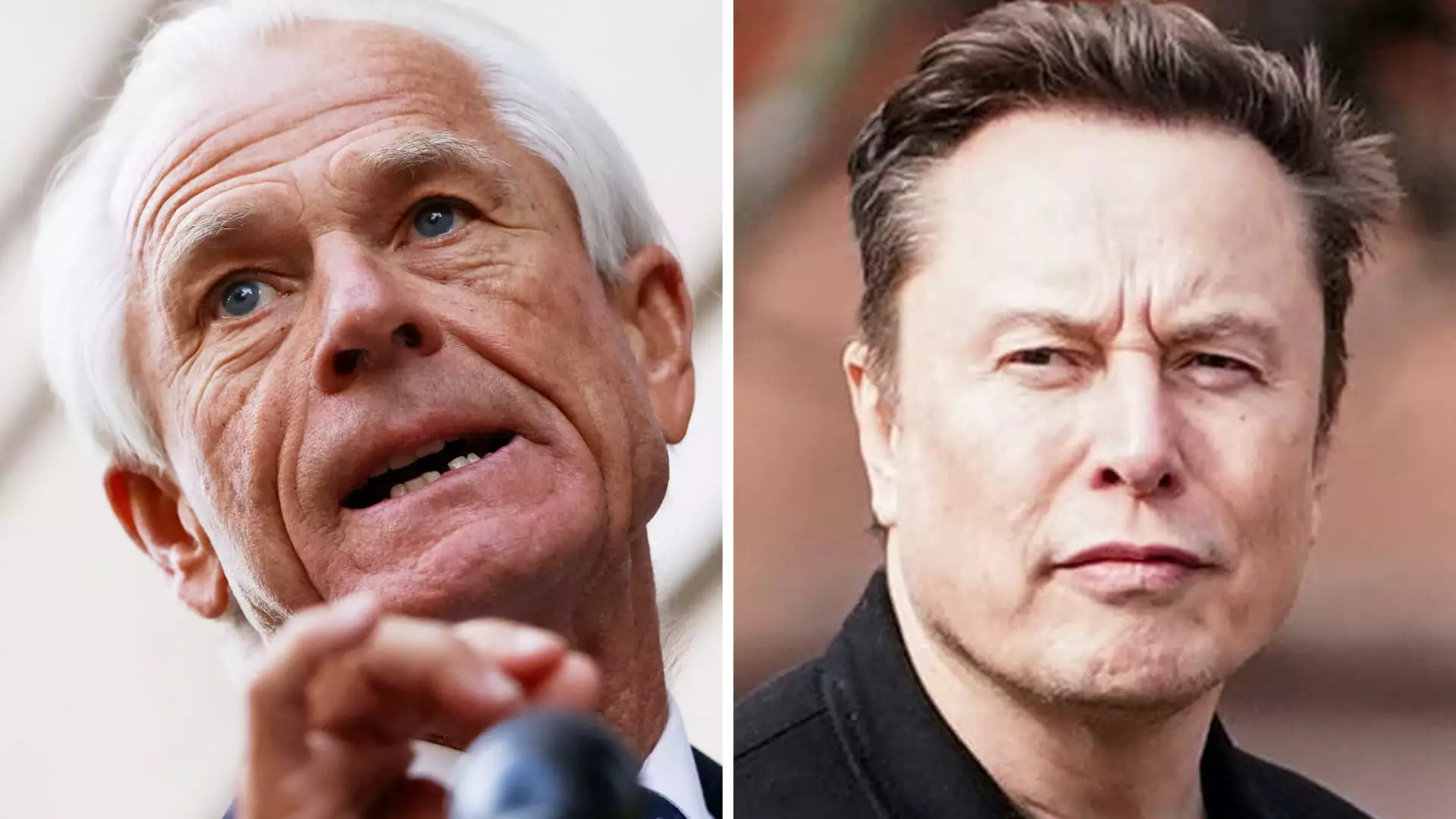The interplay between Peter Navarro and Elon Musk is emblematic of the discord that often arises in the Trump administration. Recently, Navarro, serving as the chief trade adviser, and Musk, the influential tech mogul, found themselves at loggerheads over trade policies. What appeared as a simple disheartened jab from Musk, calling Navarro a “moron,” reveals deeper fissures in Trump’s approach to trade—fissures that could potentially unravel the whole complex structure of his administration’s economic policy.
While Navarro downplayed any existing tension during a recent interview, his insistence that “everything’s fine” strikes me as typical of the denialism prevalent in current political discourse. It is clear that Navarro’s defense—rife with laughter—belies the seriousness of the challenges they face. When leading figures publicly trade barbs, it raises questions not just about their personal relationships but about the conflicting ideologies that power the Oval Office. Rather than an anomaly, this friction illustrates a core issue: the struggle to balance nationalism with globalism, trade tariffs with economic patriotism.
Trade Tariffs: A Nationalist Axiom
Navarro’s commitment to U.S. manufacturing is commendable, yet on the surface, it appears almost utopian. His vision of a self-sufficient American economy, centered on domestic production, seems increasingly antiquated in a hyper-globalized market. To want tires manufactured in Akron and engines built in Flint is a noble aspiration, but it reflects a naïve understanding of modern supply chains and economic interdependence. Musk’s retort underscores this point; a modern car manufacturer isn’t merely assembling components, but deftly navigating a global network of supply lines.
Advocating for tariffs, Navarro’s obnoxious intent seems to be shoring up national pride. But these tariffs—while intended to protect American manufacturing—could stifle innovation and adaptability. Musk’s alternative approach, featuring a “zero tariff situation,” dares to engage with the complexities of international trade. Herein lies the rift: Navarro may possess an unyielding determination to restore American industry, but Musk’s global perspective may be more aligned with a reality that demands cooperation rather than isolationism.
The Inherent Flaw of Imagineering Economics
The juxtaposition between Navarro’s hardliner stance and Musk’s reformist agenda points to a fundamental dilemma: isolating oneself from the world while expecting growth seems outdated. The very notion that tariffs will lead to a rebirth in manufacturing overlooks economic fundamentals. Increasing tariffs may serve the short-term political goals of protecting specific sectors, but they threaten the broader fabric of economic opportunity and innovation.
Musk, labeled as the “dumber than a sack of bricks” by Navarro, is more than just a tech entrepreneur—he symbolizes an evolution in thought that combines technology with an entrepreneurial ethos. By insisting that an American-made product must be built exclusively from American parts, Navarro seems to starkly ignore the fluid dynamics of global trade. Instead of recognizing the urgent need for technology-driven efficiencies, he clings desperately to a model reminiscent of the protectionist policies of the past.
Musk’s Complicated Triumphs and Gov Efficiency
It’s worth noting that Navarro begrudgingly acknowledged Musk’s role in promoting “government efficiency.” However, that initiative, steeped in the intention to eradicate “waste, fraud, and abuse,” presents a troubling double standard. If cutting government layers and jobs through draconian measures is deemed progress, then we must question whether this truly translates to better public service or if it merely reflects an optimization of corporate values at the expense of human capital.
Throughout this ongoing battle, it remains essential to remember that the resilience of any administration is contingent upon its ability to adapt and renegotiate its strategies in the face of dissent. It appears that while Musk and Navarro may conduct their highly public disagreement with cordiality, their underlying motives reveal the tension at play—a classic battle between old-world economic thinking and the dawning of a new era shaped by technology and globalism.
Ultimately, the narrative plays out as one of precarious balance, where progress, skepticism, and innovation collide in unpredictable ways. The disconnect between Navarro’s dogma and Musk’s forward-thinking perspective could well define the future course of American trade policy and economic prosperity.


Leave a Reply